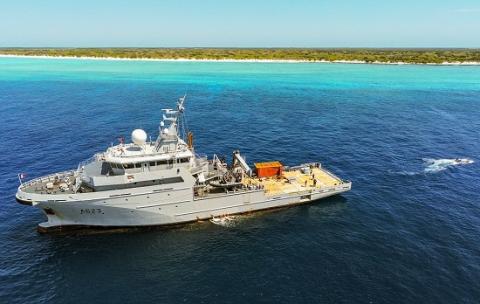
Mission Bougainville: "Ever since I was little, I've dreamed of taking part in major scientific expeditions."
Romain, 22, a master's student in Marine Sciences at Sorbonne University, shares with us his atypical career path, which combines a passion for science and communication. He tells us about his motivation for the Bougainville Mission, the challenges he anticipates and the skills he hopes to develop over the course of this adventure at sea.
Romain will be assigned to Reunion Island along with Laurine.
Can you tell us about your background?
Romain: I recently completed my first year of a Master's degree in Marine Sciences at Sorbonne University. With the Bac S in my pocket, I chose to do a double degree in Biology, Communication and Journalism at Sorbonne University and the Ecole W (another journalism school).
After this course, I decided to concentrate on the scientific aspect of my studies, as I'm passionate about the marine environment. I then joined the Marine Sciences Master’s program, which opened the doors to this mission.
What motivated you to apply for the Bougainville Mission and how did you discover this opportunity?
R.: Ever since I was little, I've dreamed of taking part in major scientific expeditions around the world. This mission gives me the opportunity and the chance to combine my taste for discovery and adventure with an exciting, meaningful scientific project.
I discovered the Bougainville Mission when I went to the first presentation meeting, which took place when I was a 3rd-year undergraduate. Applications didn't start until the Master's level, so I had a year to prepare my application.
The mission is being carried out in collaboration with the French Navy. What do you expect from this unique experience of working on board Navy ships?
R.: I'm really looking forward to getting on board a Navy ship, being part of a crew and experiencing life as a sailor. I don't think it'll be easy every day, but I'll learn a lot about myself and others.
On a different note, I'm also looking forward to getting a taste of cooking on the boat, and helping the chef if I get the chance!
How are you preparing to take on scientific responsibilities with full autonomy during the mission?
R.: To prepare for our scientific responsibilities, we attended two scientific training courses with the whole team, at the Banyuls-sur-Mer and Villefranche-sur-Mer marine stations. The aim was to familiarize us with the various tools and protocols we'll be using during the mission, through role-playing. This experience will be invaluable when we're out on our boats in the middle of the ocean.
What challenges do you foresee during this mission and how do you plan to overcome them?
R.: For me, loneliness and isolation are the greatest challenges of this mission. But I'm looking forward to it!
Organizing my time is another challenge I'll have to face. I'll have to find the right balance by setting my own objectives, whether scientific or personal.
How do you think this assignment will enrich your career and personal development?
R.: I don’t yet know how much this mission will bring me, but I know in advance that this year will be very rich, both scientifically and professionally, as well as humanly and personally. I expect it to plunge me into a world I know nothing about, to forge my capacity for adaptation, resourcefulness and autonomy. I want it to make me dream by helping me meet people from completely different horizons and discover some of the world's most beautiful regions!
What skills do you hope to acquire or develop during this assignment?
R.: As a marine science student, this mission will provide me with invaluable on-board experience, as well as autonomy and resourcefulness, which will be very useful for the future.
I also hope to develop my knowledge of plankton, their ecology and taxonomy, and improve my programming and modeling skills thanks to the mission's tools. Finally, I'd like to develop my work and community skills, leadership and patience.
Have you ever thought about what you might do after Bougainville?
R.: As part of a gap year, this year is an opportunity to take a break from my studies, experiment with new things and develop my professional project. At the end of the assignment, I'll go on to do the second year of my Master’s with lots of new ideas in mind. I'd like to continue working with Plankton Planet during my Master’s. Who knows, I could make myself useful in preparing the next Volunteer officer in training.





